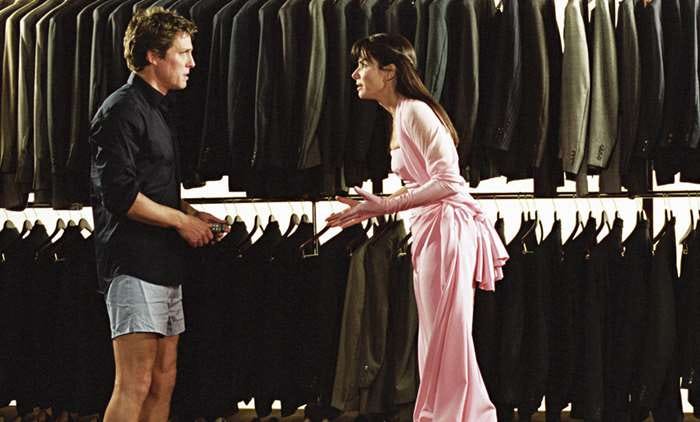Feminism strikes again. That vicious beast that transitioned me from a blissfully unaware movie-watcher into a constant critic.
Over the past few years, it has become more apparent that my favorite rom-coms are horribly problematic in their framing of women, which depresses me to no end.
So, join me on my feminist critique of a movie that once brought me so much joy: Two Weeks Notice.

A Brief Overview of Two Weeks Notice
Let’s start by drawing a picture of how I saw this movie in my youth: down-on-her-luck girl is employed by a billionaire. He’s annoying to work for, but ultimately she cannot resist his charm. Their chemistry sizzles, and wham, they’re in love. Throw in some comedic banter, and you have yourself a hit.
When I decided to rewatch this movie, I was disheartened to find it romanticizes sexism in the workplace.
Here is the actual plot of this movie:
- A Harvard-graduate lawyer is a committed activist against corporate greed
- She’s forced to work for a billionaire in her quest to save a community center.
- He begins to treat her like an assistant instead of a lawyer, which drives her to quit.
- He entraps her, denying the opportunity to work somewhere else.
… And meanwhile they fall in love? No thanks.

While this film definitely has chemistry and charm galore, it just distracts from the reality of a woman being exploited in the workplace.
Lucy Kelson, our main character, is a typical Sandra Bullock role, being a little quirky and entirely well-rounded individual. Her passion for social justice and desire to preserve low-income housing is inspiring. Unfortunately, the film circumvents this fact in order to portray her inability to find love.
George Wade: Who’d Date Him?
George Wade, our hero, is the opposite of Lucy. He’s a playboy billionaire with no morality or functional skills. He loves to hire female lawyers simply because it will annoy his brother, the head of his company. Plus, he wants the opportunity to sleep with them.
When Lucy approaches him to advocate for a community center, he assumes that she is applying to be his lawyer, not bothering to listen to her (despite stealing her words for a quote).
Sadly, Lucy begins to work for George to fulfill her part of a deal to preserve the community center.

As Lucy’s employment drags on, George repeatedly treats her as if she were an assistant, not the highly qualified lawyer that she is.
He calls her in the middle of the night while at a bar, calls her out of a wedding to help style him, and ultimately gaslights her into believing that she wants him to do this.
Lucy Tries to Move On
When Lucy finally quits, George says:
“I find you ungrateful. I hire you with no corporate experience. I give you an apartment, a great office, the nonfat muffin basket every morning. Why do you keep your phone on? You crave the excitement.“
Here, he is clearly using his power and influence to manipulate her, even forcing the blame onto her when she is clearly the victim in this situation.

When Lucy attempts to find other employment, she discovers that George has made sure that she will be unable to land a new job. If everything up to this point didn’t seem like harassment, this definitely should.
In reality, a lawsuit should be in order. Lucy becomes so stressed that she tries to get fired, going against her perfectionist type-A personality, but George again forces her to stay for a full two weeks.

The next hire is (of course) a woman. This is because George apparently cannot function without one.
During the interview, George immediately attaches himself to her and flirts relentlessly despite being her future boss. The film then transforms Lucy into a jealous woman, having meaningless fights with the new hire over George.
By the end of the movie, Lucy is working at Legal Aid and finally being able to pursue a meaningful career. Then, George proposes his love and they apparently live happily ever after.
But here’s the kicker: the script acknowledges that George is a terrible person. How do I know? Well, Lucy’s one condition in dating him is that she never wants to work for him ever again. I wonder why?
Conclusion
The moral of the story is that romanticizing harassment in the workplace should not be excused in favor of some witty banter. Can we still watch and enjoy problematic movies like Two Weeks Notice? Yes, but we need to recognize them as problematic (and just downright weird).
Sexism is rampant in our current society, specifically in the office setting. I absolutely love Sandra Bullock and Hugh Grant, especially when together, but will I ever see this movie in the way I once did? Definitely not.
Do you have a different take after watching Two Weeks Notice? Leave a comment below!